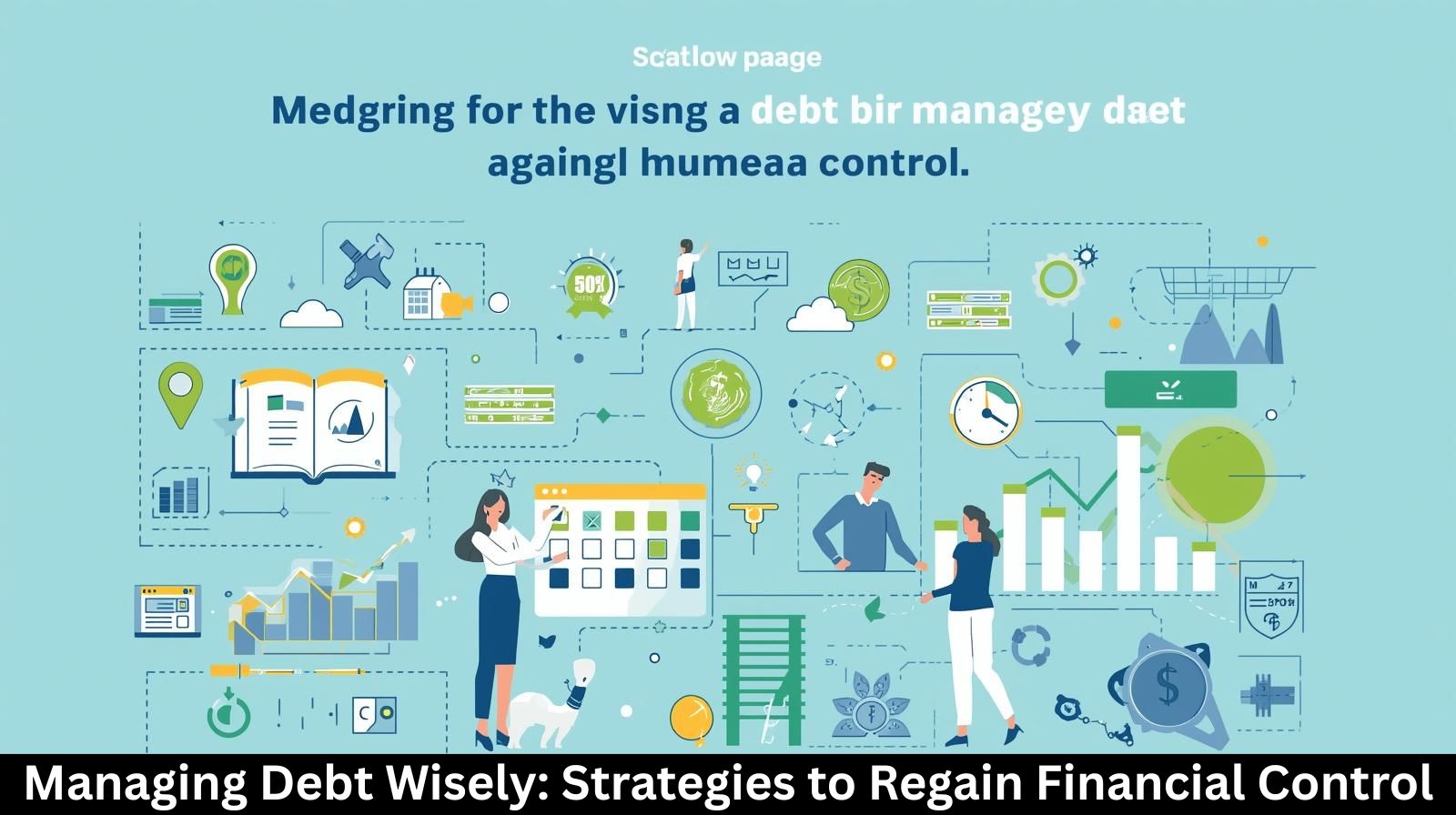Let’s face it—debt can feel like a heavy weight dragging you down. Whether it’s credit cards, student loans, or medical bills, being in debt can cause stress and limit your financial freedom. But here’s the good news: you can regain control. Managing debt wisely isn’t about being perfect—it’s about making consistent, smart decisions that lead to long-term stability.
Understanding Debt
Debt, in simple terms, is money borrowed that must be repaid—usually with interest. But not all debt is bad.
- Good debt helps you build wealth or improve your life (like a home loan or education).
- Bad debt drains your finances with little or no return (like high-interest credit cards).
The key is learning how to manage both effectively.
Common Types of Debt
Credit Card Debt
High-interest credit cards can quickly spiral out of control if you only make minimum payments.
Student Loans
These can be overwhelming, but income-based repayment plans can make them manageable.
Mortgages
A mortgage is often considered good debt, as it helps build equity and credit.
Personal and Auto Loans
Useful for emergencies or major purchases—but only if terms are reasonable and payments fit your budget.
The Hidden Cost of Debt
Interest is what makes debt dangerous. Over time, it compounds—meaning you pay interest on interest. That $1,000 balance can turn into $2,000 or more if left unchecked.
Beyond the math, debt can also take a toll on your mental health, causing anxiety, sleepless nights, and constant worry.
Signs You’re Losing Control of Your Debt
Are you only paying the minimum each month? Using one credit card to pay off another? Or maybe you’re avoiding your bank statements altogether? These are clear warning signs that your debt might be managing you—not the other way around.
Assessing Your Financial Situation
The first step to recovery is knowing where you stand.
- List all your debts – balances, minimum payments, and interest rates.
- Calculate your debt-to-income ratio – divide total monthly debt payments by your monthly income.
- Track your spending – use apps or a simple spreadsheet to find where your money leaks out.
This gives you a clear roadmap for moving forward.
Creating a Debt Management Plan
You can’t fix what you don’t plan for. Create a debt repayment roadmap that fits your income, lifestyle, and priorities.
- Set SMART goals (Specific, Measurable, Achievable, Relevant, Time-bound).
- Focus on one debt at a time while keeping others current.
- Reward yourself for milestones along the way.
Debt Repayment Strategies
The Snowball Method
Start with your smallest debt first. Each time you pay one off, you gain momentum—like a snowball rolling downhill.
The Avalanche Method
Focus on the debt with the highest interest rate first. This saves you more money in the long run.
Debt Consolidation and Refinancing
Combine multiple debts into one loan with a lower interest rate. It simplifies payments and may reduce stress.
Budgeting for Debt Freedom
A budget is your financial blueprint.
- Track every dollar that comes in and goes out.
- Cut unnecessary costs—subscriptions, dining out, impulse buys.
- Set up automatic payments so you never miss due dates.
Small adjustments today can lead to big savings tomorrow.
Negotiating with Creditors
Don’t be afraid to talk to your lenders. Explain your situation honestly—they’d rather work with you than lose payment altogether.
Ask for:
- Lower interest rates
- Waived late fees
- Extended payment plans
A polite, proactive conversation can make a huge difference.
The Role of Credit Counseling
If you feel overwhelmed, professional help is available.
Credit counseling agencies can help you:
- Create a debt management plan
- Negotiate with creditors
- Learn better money management skills
Make sure you choose a nonprofit, accredited counselor—avoid anyone promising “instant debt relief.”
Avoiding Debt Traps
Steer clear of payday loans, cash advances, and “no credit check” loans—these often come with outrageous interest rates that keep you trapped in a cycle of debt. Always read the fine print before borrowing.
Building Better Financial Habits
The best way to stay out of debt is to prevent it in the first place.
- Track your spending every week.
- Build an emergency fund—aim for at least 3–6 months of expenses.
- Live within your means, not your credit limit.
Financial freedom starts with daily habits.
Staying Motivated on Your Debt-Free Journey
Paying off debt is a marathon, not a sprint. Stay focused by:
- Celebrating small wins (like paying off your first card).
- Visualizing a debt-free life.
- Joining online communities for support and accountability.
Remember: every payment gets you one step closer to peace of mind.
Conclusion
Managing debt wisely is about more than just paying bills—it’s about taking back control of your life. With a solid plan, discipline, and patience, you can move from drowning in debt to building wealth and confidence. The road may be long, but the destination—financial freedom—is worth every step.
FAQs
1. What’s the best way to pay off multiple debts?
Use the snowball or avalanche method, depending on whether you value motivation or savings more.
2. Should I close paid-off credit cards?
Not always—keeping them open can improve your credit utilization ratio and boost your score.
3. Is debt consolidation a good idea?
Yes, if it lowers your interest rate and simplifies payments without adding new debt.
4. How can I rebuild my credit after paying off debt?
Pay bills on time, use credit sparingly, and monitor your credit report regularly.
5. Can I negotiate my debt down?
Absolutely. Many creditors will agree to reduced settlements or lower rates if you show commitment to repayment.



